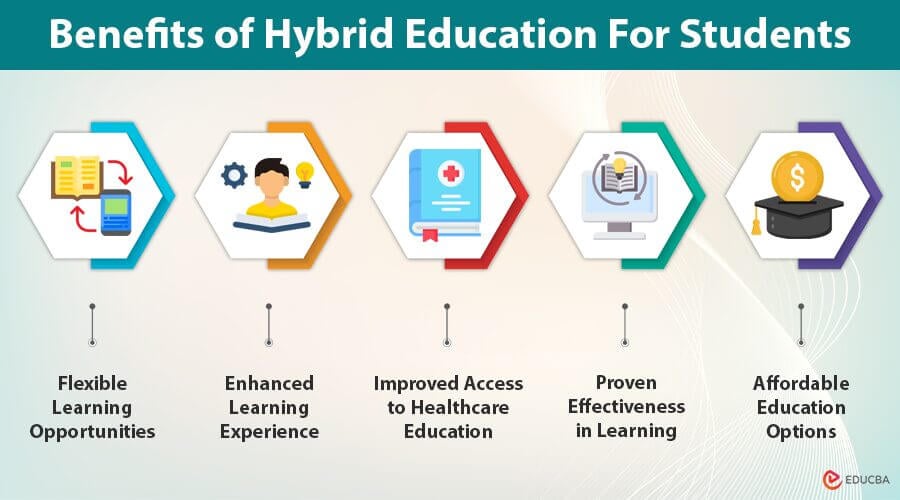
Hybrid Education: Revolutionizing Learning in 2025
Hybrid education is transforming the way we learn. Combining both online and in-person learning, it offers a flexible, efficient, and accessible approach to education. As we move into 2025, hybrid education programs are gaining popularity across various fields, including healthcare, technology, and business. This article will explain the benefits of hybrid education and how it is changing the educational landscape.
Benefits of Hybrid Education For Students
Here are five key benefits that make this learning model ideal for students across various fields.
#1. Flexible Learning Opportunities
Hybrid education combines the best of online and in-person learning, providing unmatched flexibility. Students can complete online modules at their own pace while participating in hands-on, in-person sessions for practical training. This approach allows learners to adapt their education to their unique schedules and responsibilities, making it ideal for working professionals, parents, or those with other commitments.
Higher education is more accessible to individuals who can attend classes from anywhere and study at convenient times. Hybrid education also ensures that students can stay on track with their goals no matter how busy life gets. Flexibility is key for those seeking a balance between life, work, and education.
#2. Enhanced Learning Experience
Online courses allow for self-paced study, enabling students to revisit content as needed. Meanwhile, in-person classes offer valuable face-to-face interaction with instructors and peers, enhancing understanding and fostering collaboration.
Hybrid education caters to different learning styles, making it more effective than either format alone. Group activities, hands-on projects, and virtual tools further enrich learning. This approach is particularly beneficial in fields requiring theoretical knowledge and practical experience, helping students develop critical thinking and communication skills.
#3. Improved Access to Healthcare Education
Hybrid education has made it easier for students in the healthcare field to gain the necessary skills and knowledge for their careers. For aspiring nurses, medical assistants, and other healthcare professionals, hybrid programs provide the best of both worlds: the flexibility to learn theoretical content online and the opportunity to apply that knowledge in real-world, hands-on clinical sessions.
Hybrid education has become especially popular in remote areas with limited access to educational institutions. By offering online modules, hybrid programs allow students to study from the comfort of their homes while benefiting from the in-person clinical experience needed for their profession.
#4. Proven Effectiveness in Learning
Research from reputable sources, such as the NIH, supports the effectiveness of hybrid education. Studies show that students in hybrid programs tend to engage more actively with the material and retain information better than those in fully online or traditional classrooms.
Hybrid education fosters a deeper connection with the material by combining multimedia tools, interactive exercises, and in-person training. This method is especially effective for fields requiring skill development, such as healthcare and technology, where theoretical understanding and hands-on practice are crucial for success.
#5. Affordable Education Options
Hybrid education offers a more affordable alternative to traditional on-campus learning. Since a portion of the coursework can be completed online, students save on commuting, housing, and other expenses associated with in-person learning. Many hybrid programs also replace expensive textbooks with digital resources, reducing costs.
This financial flexibility makes education accessible to a wider audience, including those with limited budgets. Hybrid programs are an excellent solution for individuals seeking affordable ways to enhance their skills or pursue new career opportunities.
Final Thoughts
Hybrid education is revolutionizing the way we learn, offering a blend of flexibility, accessibility, and effectiveness. With technological advancements, hybrid learning models are becoming more interactive and engaging, bridging the gap between traditional and online education. As we move forward into 2025, the benefits of hybrid education will continue to shape the future of learning. With its ability to combine the best of both worlds, hybrid education provides an adaptable and accessible path to achieving academic and professional goals.
Recommended Articles
We hope this guide on the benefits of hybrid education helps you understand how this flexible learning model can enhance student engagement and educational outcomes. Check out these recommended articles for more insights into making the most of hybrid learning environments.
